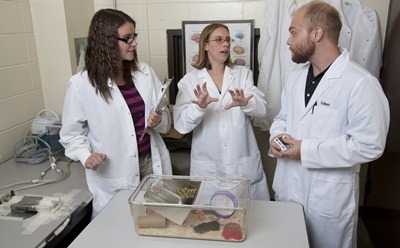
Psychology Professor Angela Grippo (center) in her laboratory with student researchers Rachel Murphy and Wil Colburn.
In the laboratory of award-winning researcher Angela Grippo, mouse-like creatures known as prairie voles are getting an extreme makeover – habitat edition.
Nothing too fancy, mind you – a running wheel, chewy toys, tinfoil balls and furnishings that include a paper towel roll and miniature igloo for cozy hiding places.
By enriching the living environment of the prairie voles, the NIU psychology professor and her team of student researchers aim to produce significant health benefits in the animals – and demonstrate ways to prevent and treat mental health and cardiovascular diseases in humans, too.
Grippo’s new multi-year research project investigating links between the environment and health is being funded by a $354,000 grant award from the National Heart, Lung and Blood Institute, a division of the National Institutes of Health.
Benefits of an improved environment
“In our own research, we’ve found that environmental enrichment can prevent depression and anxiety behaviors in prairie voles exposed to social stress,” Grippo says. “Now we’re extending these results by investigating whether enrichment can also be a useful treatment.”
The research is of interest to health officials worldwide.
In humans, depression is the top cause of disability and quality-of-life problems. The prevalence of depression in patients with coronary artery disease is about five times that of the general population, and in all developed countries, heart disease is the No. 1 killer of both men and women.
Grippo’s work has been getting increased attention. This past summer, the American Psychological Association presented her with its Award for Distinguished Early Career Scientific Contribution to Psychology. The APA cited Grippo’s use of animal models and sophisticated behavioral and neuroscience methods in advancing understanding of the connections among depression, stress and physical disease in humans.
Why prairie voles?
Prairie voles wouldn’t make for good pets – their natural instinct is to bite.
But the rodents do make for excellent animal models because they exhibit human-like social behaviors, typically mating with the same partner for life, raising offspring together and forming strong family bonds.
Previous studies by Grippo demonstrated that when these bonds are broken and voles become isolated, the animals show both depression and anxiety behaviors, exaggerated responses to stress and risk factors for heart disease.
“Our research with prairie voles is directly relevant to the emotional and physical health of humans,” she says. “In people, emotional and cardiovascular health is intimately linked to social experiences.
“We investigate how social experiences in the voles influence the brain and the body, and the biological processes that may explain why environmental enrichment can be protective for one’s health. With a better understanding of how social stress influences emotion and the heart, we can design more effective prevention strategies and treatments for people who are experiencing problems with mood, social interactions or heart disease.”
In humans, the environment can be enriched through physical exercise, activities that involve manual dexterity and activities that engage cognitive areas of the brain, such as crossword puzzles or word games.
A student training ground
Research findings aren’t the only objective of Grippo’s new grant, however. Her laboratory also serves as a unique training ground for a large contingent of NIU students.
“A primary goal of the new grant is not only to better understand important interactions among emotion, stress and the heart, but also to provide unique learning experiences for both graduate and undergraduate students at NIU,” Grippo says.
Rachel Murphy, a sophomore psychology major from New Lenox, says she is learning lessons that aren’t found in the textbooks.
“My lab experience will help me get a deeper understanding of psychology,” she says. “I love the atmosphere and the people I work with. We all get along and work really well together. No one is afraid to ask questions and discuss the answers, and Dr. Grippo is always willing to help.”
Junior psychology major Elliott Ihm of DeKalb believes his experiences in Grippo’s lab will help him in graduate school.
“I have learned that the research process is anything but clear-cut. Good research is the product of hunches followed up by many hours of toil and tedium, not of any standard, stepwise procedure,” Ihm says. “The reason I joined the Grippo Lab was to bolster my graduate school application, but becoming familiar with various research techniques and getting used to the scientific process in general will also be tremendously helpful as I pursue my own research in the future.”
Other student’s in Grippo’s research group include undergraduates Ashley Dotson, Nalini Jadia, Rachel Schultz and Andrew Wegner, along with graduate students William Colburn, Neal McNeal and Joshua Wardwell and postdoctoral researcher Melissa-Ann Scotti.
Twenty other students have participated in Grippo’s research in past years.
“The students in my laboratory work extremely hard,” Grippo says. “They are dedicated to advancing science and helping to improve human health.”

